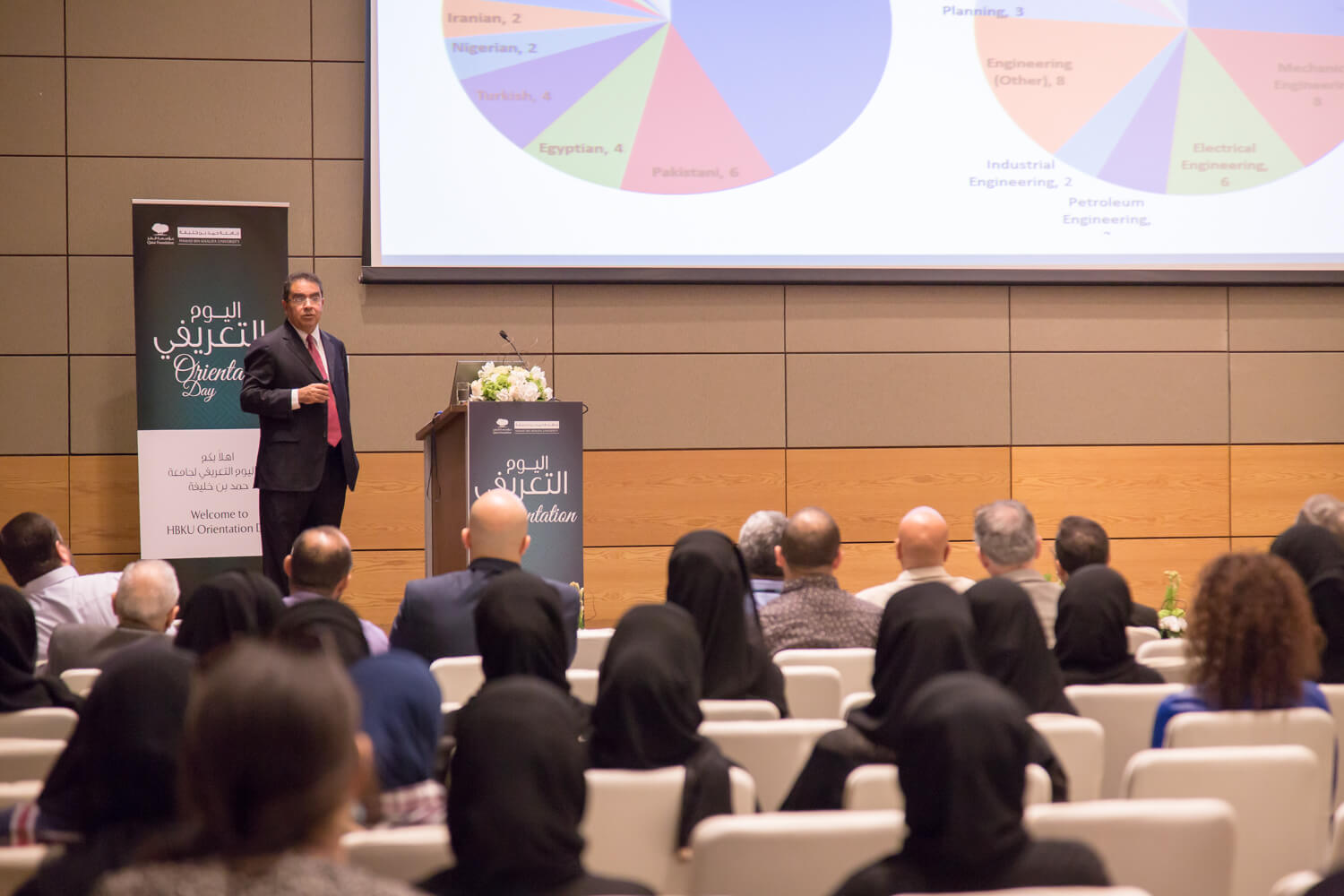
Hamad Bin Khalifa University, a member of Qatar Foundation for Education, Science and Community Development, has kicked off the 2015-2016 academic year by welcoming a record intake of more than 200 students across a significantly expanded range of programs.
This year, HBKU welcomes its first cohort of students pursuing a Juris Doctor (JD) law degree through its newly established graduate law school, as well as the first master’s and Ph.D. students in Biomedical and Biological Sciences, Sustainable Energy, and Sustainable Environment through its College of Science and Engineering.
In addition to these new offerings and the existing graduate programs offered by the Translation and Interpreting Institute and Qatar Faculty of Islamic Studies, the university also welcomes its first undergraduate students this year, with the launch of its Bachelor of Science in Computer Engineering program.
HBKU President, Dr. Ahmed Hasnah, commenting on the expansion of programs, said: “This year marks the beginning of an important new chapter for Hamad Bin Khalifa University. The launch of six new master’s and Ph.D. programs, plus the introduction of a graduate law school that is the first of its kind in the region, is a significant milestone in the university’s short history.
“Hamad Bin Khalifa University is committed to fulfilling the vision of Her Highness Sheikha Moza bint Nasser, Chairperson of Qatar Foundation, by providing high-quality graduate research programs that are aligned with the grand challenges of Qatar and the region, and promoting a knowledge-based society.
“Quality education is the foundation of a thriving society. Our new students are the leaders of the future, and the university will spare no effort in arming them with the knowledge needed to help them start building that future today.”
Competition for the programs was extremely intense. Newly admitted students represent a wide range of academic and professional backgrounds and Qatari students are well represented across all programs. Among the new programs, Qataris make up more than half of students enrolled on the Biological and Biomedical Science graduate programs and in excess of 70 percent of the first Juris Doctor class.
Ali Al-Sharshani, who is embarking on one of the new doctoral programs of HBKU’s College of Science and Engineering currently works as an engineer at Qatar Shell. He commented: "I was drawn to HBKU’s Ph.D. in Sustainable Energy because I saw a perfect fit with Qatar National Vision 2030. With all the development Qatar is undergoing, there is an ambition to create a sustainable society. I think what I will learn over the next few years will help me further contribute and give back to the country."
Maha Al Khater added: "I was drawn to the JD program because I believe the country is growing quickly and needs people who understand the environment, as well as the potentials and aspirations of the state. I'm excited to be part of Qatar's vision for the future and to be studying law, which is the essence of development in my opinion. "
In addition to targeting the educational needs of the local population, the university’s reputation is also growing internationally, drawing talented students from around the world
Sulaiman Timbo Bah, who completed his undergraduate degree in the United States at the College of William and Mary, was interested in a graduate program in public policy to complement his work experience: "What drew me to the program at QFIS is not only the Islamic perspective, but also the opportunity to study in a country that is a gateway to the world. Bringing together so many different minds and perspectives - from a human development perspective, it’s an exciting time to be in Qatar."
Though diversity is important to all of HBKU’s colleges, at HBKU’s Translation and Interpreting Institute, cross-cultural exchange is essential for successful translation and interpretation across various national and social contexts. Omama Osman explained: “I was drawn to the field of translation studies because I’m interested in bridging the gap between Arab countries and English-speaking countries.”
In addition to an expanded student body, the university also welcomes many new faculty members across its academic departments. At HBKU Orientation 2015, Dr. Khalid Al-Khanji, Vice President of Student Affairs at HBKU, remarked: “Building a distinguished academic institution does not only require the organization of diverse degrees, but also exceptional students and faculty members to be the pioneers and leaders of these programs. We are proud to have you join our emerging research university. Welcome to the HBKU family.”
Those interested in learning more about HBKU and its academic offerings may do so at http://www.hbku.edu.qa/ .





